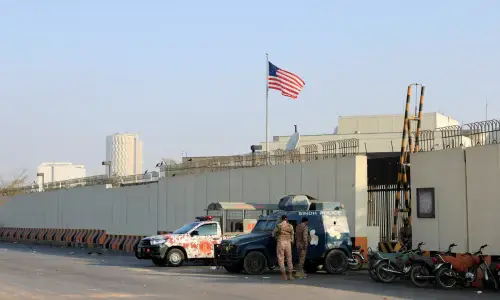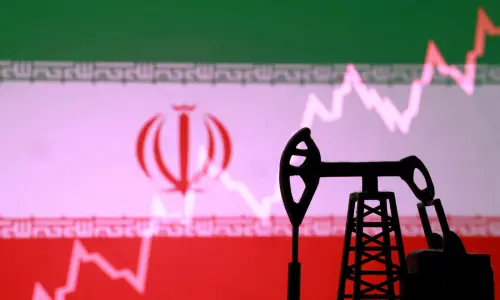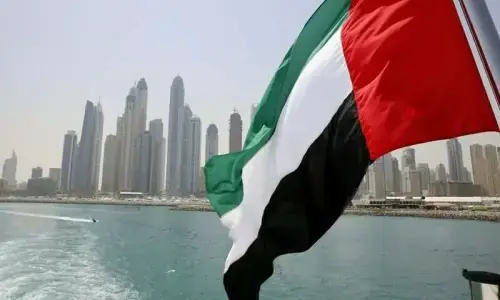THE Frontier Constabulary (FC) was created when the Samana Rifles and Border Military Police — forces with a similar objective — were amalgamated under the Frontier Constabulary Act, 1915. In creating this force, the initial aim was to deploy the hardy tribesmen on the border of the tribal areas and settled districts to safeguard settlements from the frequent raids of unruly tribes. These raids were intended to coerce the British into resolving ongoing disputes with the area’s fiercely independent Pakhtun tribes.
The role of FC has changed after partition; the federal government was empowered to deploy the force to deal with law-and-order situations and natural disasters countrywide.
Each FC platoon comprises 43 members and four followers providing services to the unit. Recruitment for each platoon is from a particular tribe/sub-tribe. It is a self-sufficient body of men who can be mobilised swiftly for deployment across Pakistan. Their rigorous training leverages the inherent fighting skills of tribes to transform individual platoons into a disciplined and small solid fighting unit.
To address the most difficult operational challenges, the force’s structure channels the bonds of tribal affiliation for effective cohesion. To maintain its civilian character, the FC is commanded by officers of the Police Service of Pakistan. Given its extensive experience of collaborating with the police during natural disasters and serious public disorder situations, FC enjoys a natural bonding with the civilian police. For all such duties, the force is placed under the command of police officers responsible for on-ground operations, thus ensuring the unity of command and allowing for the emergence of an arrangement conducive to the establishment of a cohesive functional merger.
The Frontier Constabulary can combine with the civilian police, instead of working as a parallel force.
Maintenance, superintendence, administration and control of FC vests with the federal government. Comprising a force of over 30,000, FC has its corps headquarters in Peshawar. It is headed by the commandant Frontier Constabulary, an officer of the Police Service of Pakistan with the rank of IGP assisted by several staff officers seconded from PSP. There are 17 districts in total known as FC districts. Each district is headed by a district officer, commonly known as DOFC of the rank of superintendent of police.
Since independence, its original role to protect the settled districts and regulate the entry of tribesmen has been radically revised. In a departure from its original border policing functions, FC is now frequently deployed to protect the assets of the federal government nationwide and to extend aid to the civilian police in all the provinces to tackle serious law-and-order situations.
Due to its high standards of discipline, FC is in great demand by federal establishments to protect their assets. Its role in dealing with hard targets in anti-dacoit operations in Sindh and tackling terrorists as well as large-scale urban disturbances has been commendable. Its experience in the settled areas has been invaluable in the Fata merger, a complex management undertaking by the state implemented in the aftermath of the complete breakdown of the administrative structure in that region.
A fine force with glorious traditions which has delivered outstanding results, FC has to its credit a long list of martyrs who made the ultimate sacrifice to make Pakistan a safer and better place. Given the increasing need for such a force, it is time to formally recognise its role as a truly civilian law-enforcement establishment and use its services to full capacity. The federation has only this reserve force commanded by the police.
FC is already assuming responsibility as a reserve force for the newly merged tribal areas. Thus, it can seamlessly combine with the civilian police, instead of working as a parallel force under an independent command. Working independently would dissipate resources and weaken the law-enforcement arrangement. The present commandant Salahuddin Mehsud of FC has proved to be a visionary commander in foreseeing the need for such a force. Training the force in crowd control and public dealing while blocking and isolating red zones to create safe spaces is underway. FC needs to be converted into a federal police reserve force, without changing its composition and with proper infrastructure and additional FC districts in the newly merged areas as well as the rest of the country. For the time being, its members should continue to be recruited from amongst tribesmen. Such a composition has a dual advantage given that it leverages the natural discipline and instincts of warriors as well as their tribal instincts to protect and confront foes.
A strong, well-trained and properly equipped force that moves fast will also reduce the reliance of political governments on civil armed forces commanded by army officers for policing. Caveats as to such forces include:
— The human rights credentials of the country are questioned due to the erroneous perception that these forces are an extension of the army.
— In our toxic political arena, politicians are prone to blaming the institution of the army for any individual lapse by any member of the force commanded by army officers.
— Anti-state elements of society invariably find fault with their working and project it as persecution of a particular segment of the population.
— The media of a hostile country also tries to hurt the army for any incident.
FC meets all the benchmarks for law enforcement purely through a civilian police force universally advocated by a modern society. Further, its deployment cannot be categorised as military-led law enforcement. In fact, at present it is the only civilian paramilitary force deployed in support of provincial police forces in all kinds of emergencies.
Considering the concerns of the international community and the situation on ground wherein Pakistan faces governance challenges due to political instability and the ongoing pursuit of a political and democratic path, redefining the role of FC provides the much-needed option of a fully trained civilian federal reserve force with far-reaching benefits for the country, The only condition is that the force remains apolitical without any interference in its administration with guaranteed and complete operational autonomy and a fixed tenure for the commandant and the senior hierarchy of the force.
The writer, a former IGP Sindh, belongs to Gilgit-Baltistan.
Published in Dawn, August 26th, 2022




























